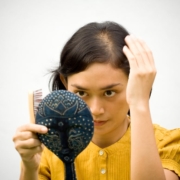Understanding DHT and its Effects on Hair Loss
There are many reasons why you may be experiencing hair loss and/or thinning. Causes for hair loss in both men and women include genetics, diet, stress, environment, medication side effects, autoimmune diagnosis, underlying medical concerns, and the influence of hormones, notably DHT on hair loss.
Our evidence-based approach begins with answering the question ‘WHY’ and from there crafting an individualized treatment plan for each client.
We accomplish this by a combination of magnified scalp imaging (Trico scope) and a customized blood panel testing for specific vitamins, minerals, and hormones that affect hair growth and contribute to hair loss/shedding.
Through our AlopeciaDX blood test, we’ve found an increase in dihydrotestosterone (DHT) is the most common culprit behind male hair loss and is responsible for 25% of thinning in women.
For this reason, our combination therapy approach often includes DHT blocking shampoos & supplements.
What is DHT and how does it relate to hair loss and hair thinning?
Dihydrotestosterone (DHT) is an androgen (sex hormone) and a byproduct of testosterone that gives males their sex characteristics such as a deeper voice, body hair, sex drive, and muscle mass. Overproduction of this hormone can cause hair thinning and eventually, male or female pattern hair loss. Testosterone is also produced by women but because women produce estrogen it helps prevent testosterone from converting into DHT.
How does DHT work?
DHT is converted into testosterone with the help of alpha 5-reductase enzymes. If there is a large amount of DHT it can attach to the receptors on hair follicles in your scalp and cause them to decrease in size and cause hair thinning. If there is a genetic link to hair loss DHT can cause hair loss at a much faster rate in both men and women.
How do high or low levels affect the human body?
High levels of DHT can lead to certain health conditions and cause problems in sexual development during puberty.
Low levels of DHT can delay puberty for both men and women and may lead to delayed sexual organ development, changes in body fat, and can affect the prostate gland.
How does DHT contribute to hair loss?
An abnormal amount of DHT can cause hair follicles to shrink at a faster rate, causing them to look thinner and eventually causing hair to fall out. If you have a history of genetic thinning, DHT can accelerate the rate of hair loss.
DHT and Women?
Women may have an excess amount of androgens during menopause or close to menopause because their bodies stop producing estrogen and progesterone. This, in turn, causes a higher percentage of sex hormones such as DHT in the body and typically leads to hair thinning.
DHT and Men?
Male pattern baldness affects 50 percent of all men in the US, the presence of DHT affects the hair follicles on the scalp leading to accelerated hair thinning and loss.
What can I do to reduce DHT?
There are various oral and topical medications that can help target DHT, they can either block or inhibit the rate of production. Popular medications prescribed by most health care providers that are specific for hair loss include:
Finasteride: also known as Propecia. Finasteride blocks the metabolism of testosterone which is how it can help prevent hair loss and is also used to decrease prostate enlargement; one unpleasant side effect is also a decreased sexual function. A study done at Harvard reported a rare decrease in irreversible sexual function, effecting 4%-6% of men.
Minoxidil: better known as Rogaine. There is a foam-based and solution-based formulation that is used for hair growth in the treatment of male pattern baldness, female pattern baldness and thinning. It is not used for baldness at the front of the scalp or receding hairline in men. HPI uses a topical solution with Minoxidil called Re-stim, which has more natural carrier agents such as aloe vera, rather than large amounts of alcohol which can dry out and irritate the scalp.
Dutasteride: Mostly used to treat enlarged prostate, Dutasteride prevents the conversion of testosterone to dihydrotestosterone (DHT) in the body which is why it is used for treating hair loss. There are side effects that are rare but should be considered, such as impotence, decreased sex drive, breast tenderness, and testicular swelling to consider when taking this medication.








